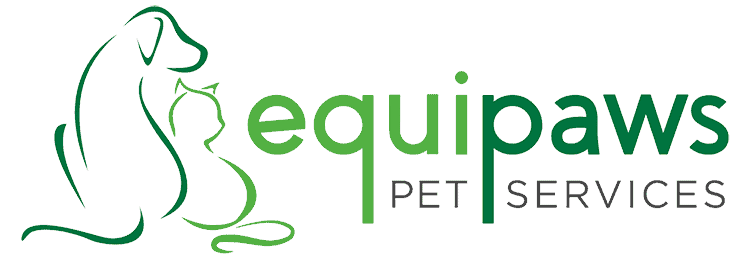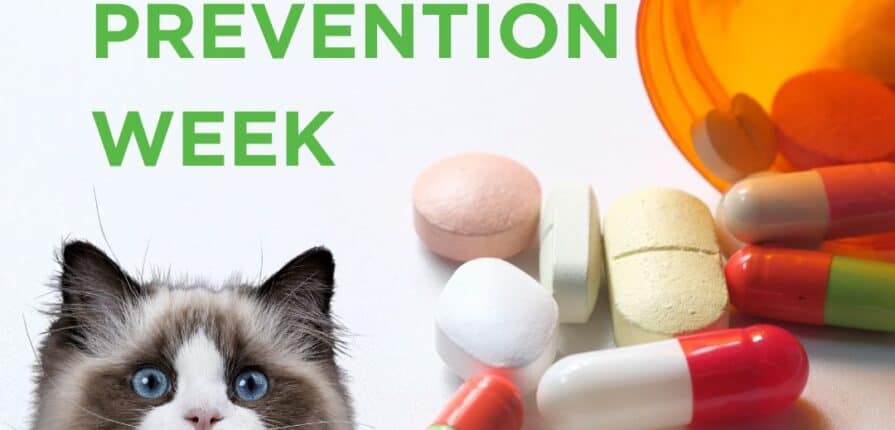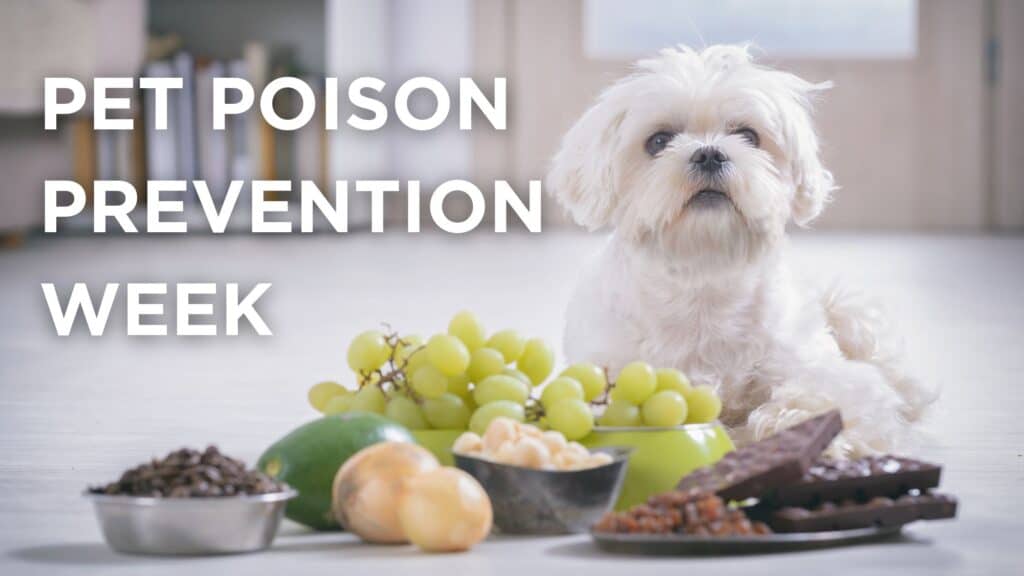National Pet Poison Prevention Week: Top 10 Pet Poisons and How to Keep Your Pets Safe
If you look under your sinks and in your cupboards, you’ll likely find multiple harmful products and poisons that could hurt or kill your pets. National Animal Poison Prevention Week is formally observed from March 17-23 and helps remind us pet parents to poison-proof our homes against common household dangers to our pets. Dogs, cats, and other little critters are curious creatures who can easily encounter and ingest toxic substances.
We’ve looked to the ASPCA Poison Control Center to guide us. Each year, their board-certified veterinary toxicologists analyze the data from thousands of calls from pet parents and identify the most common poisons and toxins pets encounter. Here’s an expanded guide on the top 10 pet poisons and practical tips to prevent accidental poisoning. https://aspca.org/about-us/press-releases/more-400000-animals-assisted-aspca-animal-poison-control-center-2023
-
Human Medications: Prescription and OTC!
Common Culprits: Painkillers (e.g., ibuprofen, acetaminophen), antidepressants, ADHD medications, heart medications, Xylitol in medications, dental care items, and even beauty products!
Did you know that human over-the-counter medications are the top toxin on the ASPCA Poison Control Center’s list, making up “nearly 17% of the APCC’s total call volume for the year”? It tells us that we must be extra vigilant about locking away our meds.
Pet Poison Prevention Tips: Always keep medications in child-proof containers and stored in cabinets out of pets’ reach. Make sure you don’t drop your pills when taking them, and if your beauty products contain Xylitol, don’t let your pets lick you!
-
Foods Toxic to Pets in Your Pantry
Common Culprits: Chocolate (especially dark chocolate), xylitol (a sweetener found in many sugar-free products), grapes and raisins, onions, garlic, and alcohol.
We’ve written whole blog posts about foods that are poisonous to your pets, and food products are the second highest reported source of poisoning with the ASPCA. This includes protein bars and drinks, grapes and raisins, and items with xylitol, such as chewing gum.
Xylitol is a sneaky one that pops up not just in food but also in our medications and beauty products. Be on the lookout for alternative labels for Xylitol, such as “birch sugar” or “artificial sweetener (birch derived)” when purchasing your peanut butter and other items, and always keep food out of reach.
Pet Poison Prevention Tips: Educate all family members about the dangers of these foods to pets. Avoid feeding pets table scraps and ensure trash cans are securely closed. Always keep your food away from your pets, and train dogs in the “leave it” command.
-
Alcohol and Recreational Drugs Are Bad, M’Kay?
Common Culprits: Alcoholic beverages, marijuana, and other recreational substances.
Recreational drugs including marijuana-based drugs, hallucinogenic mushrooms, and cocaine made the top toxins list for the first time in 2022 knocking out gardening products and remained steady in the tenth spot for a second year. The cases involving recreational drugs most commonly seen at the APCC involve pets ingesting marijuana-laced baked goods which are more dangerous than ingesting plant material and can result in symptoms such as stomach upset, urinary incontinence, and ataxia.
Pet Poison Prevention Tips: Never leave alcoholic drinks unattended, and store recreational drugs in secure locations. Be mindful of guests’ belongings during gatherings to prevent accidental pet access.
-
Household Plants Toxic to Dogs and Cats
Common Culprits: Lilies (particularly toxic to cats), Sago palm, Tulips, Azaleas, and Rhododendrons, Dieffenbachia
We see a lot of lilies and tulips in the Spring, and both are toxic to dogs and cats. If you’re a cat parent, please do not accept lilies or any of the above plants into your home. The ASPCA has a database where you can search for toxic or non-toxic plants. Head over there to make sure your backyard and home are free from dangerous plants!
Pet Poison Prevention Tips: Opt for pet-friendly plants and keep potentially toxic flora out of reach. When in doubt, consult a veterinarian or reference a pet-safe plant list before purchasing indoor or outdoor plants.
-
Rodenticides and Insecticides
Common Culprits: Rat and mouse poisons, snail and slug baits, and insecticides.
The ingredients that attract rats to rodenticides also attract cats and dogs. They are incredibly toxic in all forms and can cause bleeding, kidney failure, seizures, or even death when ingested by pets. Learn about the different rodenticides to avoid here. Learn how to apply insecticide properly and safely for your pets here.
Pet Poison Prevention Tips: Seek alternative, pet-safe methods for pest control. If you must use these products, place them in locations completely inaccessible to pets and monitor pets while outside.
If your pet ingested it, make sure you can identify it and call the APCC at (888) 426-4435 or take your pet and the packaging information to your veterinarian immediately.
-
Toxic Household Products for Pets
Common Culprits: Essential oils (cats), ammonia, chlorine, and laundry detergent pods.
When cleaning your pets’ areas, avoid using products that contain bleach, chlorine, and some essential oils. Direct exposure can cause skin irritation, respiratory problems, and liver damage. Be especially careful with your cats regarding chemicals and essential oils such as tea tree oil. Birds are especially susceptible to fumes from cleaning products, so make sure you consult with your veterinarian on the best cleaning products for your avian buddies.
You can use commercial disinfectants, but make sure to rinse the area off with clean water and ventilate your home while using them. Better yet, switch over to vinegar for your daily cleaning.
Pet Poison Prevention Tips: Store cleaning products in locked cabinets and consider using natural, pet-safe alternatives. Ensure pets are out of the area when using these products and that any residue is thoroughly rinsed away.
-
Fertilizers and Plant Food
Common Culprits: Products containing blood meal, bone meal, iron, and more.
It’s strange how beautiful gardens and flowers thrive on fertilizers, but the same chemicals can seriously harm pets. Keeping those stinky fertilizers out of your dog’s reach is vital. Small amounts can cause stomach irritation. Larger amounts can severely poison your pets due to the concentrated chemicals like iron and nitrogen. Some meal fertilizers can create obstructions or pancreatitis.
Pet Poison Prevention Tips: Store fertilizers out of pets’ reach and follow label instructions carefully. Water your lawn or garden thoroughly after application to help dilute the products before letting pets back into the area. Set up a fence around fruit trees or any fertilized areas to prevent your dogs from eating the fertilizer.
-
Flea and Tick Products
Common Culprits: Misapplication of dog flea and tick products on cats, overdose, or incorrect product usage.
Cat parents must be extra careful when checking labels when purchasing flea and tick products online or in pet stores. Applying dog flea and tick products to your feline friends can mean seizures or death because they metabolize chemicals differently than dogs. As Petmedic says, cats are not simply little dogs.
Pet Poison Prevention Tips: Strictly follow the product’s application instructions and only use species-specific treatments. Consult your veterinarian before starting any new flea and tick prevention regimen, and double check the package before applying any medication.
-
Veterinary Medications
Common Culprits: Incorrect dosing or administration of pet medications, including pain relievers and de-wormers.
Please keep medications locked away the same way you would human medications. Do not use one pet’s medication for another pet without getting approval from your veterinarian. Dosages vary by size and species. If your pets get into any medications, immediately call your veterinarian and take them to be seen if necessary.
Pet Poison Prevention Tips: Always follow your veterinarian’s dosage instructions and keep pet medications separate from human medications to avoid mix-ups.
-
Bonus for Northerners: Antifreeze (Ethylene Glycol)
Common Culprits: Automotive antifreeze and coolant, which pets may find appealing due to its sweet taste.
Pet Poison Prevention Tips: Clean up spills immediately, no matter how small, and store antifreeze containers securely. Consider using pet-safe antifreeze products that contain propylene glycol instead.
Immediate Actions if Poisoning is Suspected
If you suspect your pet has ingested a toxic substance, act immediately. Contact your veterinarian or the ASPCA Animal Poison Control Center at (888) 426-4435. Quick and informed action can be crucial to your pet’s recovery.
By being proactive and vigilant, pet owners can significantly reduce the risk of pet poisoning. National Animal Poison Prevention Week is an excellent opportunity to reassess your home and habits to ensure they align with the best practices for pet safety.
Sources:
- ASPCA Animal Poison Control Center: ASPCA APCC
- Pet Poison Helpline: Pet Poison Helpline

A founding member of the Equipaws family, Frankie can mostly be found working behind the scenes, helping co-create online branding, managing several social media accounts, designing brand collateral, writing copy, and managing events. She also fills in for pet sitters and dog walkers when needed in Palmetto Bay, Pinecrest, and South Miami. Her own small pack consists of Boots the Shih Tzu mix and Nutmeg the Chiweenie.


